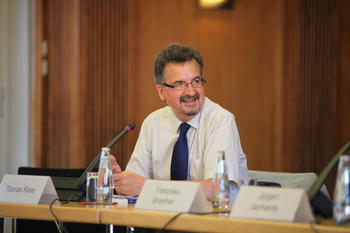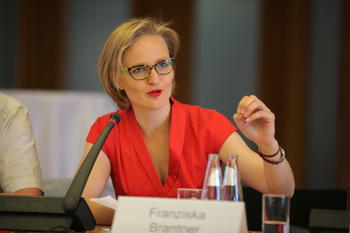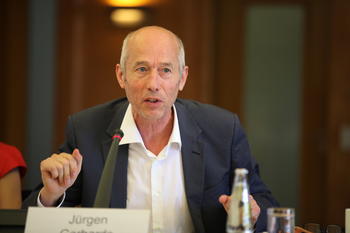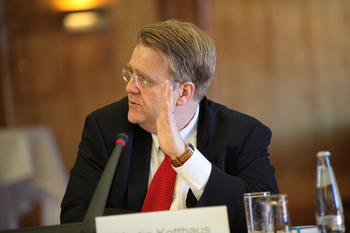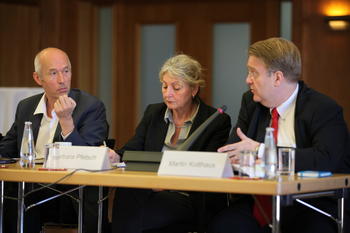Report: KFG Breakfast Book Launch & Panel Discussion "European Public Spheres. Politics is Back"
Aug 05, 2015
Prof. Thomas Risse, Dr. Franziska Brantner, Prof. Jürgen Gerhards, Prof. Barbara Pfetsch, Martin Kotthaus
Image Credit: Bettina Volke
Prof. Thomas Risse
Image Credit: Bettina Volke
Dr. Franziska Brantner
Image Credit: Bettina Volke
Prof. Jürgen Gerhards
Image Credit: Bettina Volke
Martin Kotthaus
Image Credit: Bettina Volke
Prof. Jürgen Gerhards, Prof. Barbara Pfetsch, Martin Kotthaus
Image Credit: Bettina Volke
The Euro crisis has triggered an unprecedented politicization of European affairs: Since the beginning of the crisis, the European Union (EU) and its policies have become a prominent issue that is controversially discussed in the media of EU member states. But does this really mean that a ‘Europeanization’ of national public spheres is taking place? This question dominated the discussion on the newly published book “European Public Spheres. Politics is Back” which has been edited by Thomas Risse and was officially launched on 1 July 2015 in the premises of Berlin-Brandenburgische Akademie.
Early on Wednesday morning, the event was opened up with a breakfast reception. Among the participants of the discussion panel were Franziska Brantner (MdB, Alliance ’90/The Greens), Jürgen Gerhards (Freie Universität Berlin), Martin Kotthaus (Foreign Ministry, Head of European Department) and Barbara Pfetsch (Freie Universität and contributing author).
“The book is not easy to read, but it is very thrilling”, commented Martin Kotthaus. According to the Head of European Department in the Foreign Ministry, Europe has always been a highly political issue. However, according to him, there can be no talk of a ‘Europeanization’ of national public spheres. Often, language barriers make it difficult to discuss European affairs at the European level.
In opposition to Mr. Kotthaus, Franziska Brantner was more optimistic about Europeanization. From her point of view, Europeanization has already taken place. To advance the discussion on European affairs, one should stop trying to create a common European frame, which is almost impossible considering the variety of opinions among EU countries. Instead, different frames should be discussed together at the European level. Otherwise, by ignoring certain frames, one leaves scope for national populism.
Beside his role as a moderator Jürgen Gerhards also commented on the volume. In his opinion, “European Public Spheres” is a well-made, insightful book. However, Gerhards also put some points of criticism up for discussion. First of all, from a sociological perspective talking about ‘social public spheres’ makes more sense than talking about ‘political public spheres.’ Furthermore, the sociologist raised the question if one could talk about the ‘internationalization’ of public spheres giving the example of the international debate on the Greek crisis.
As a scholar of political communication, Barbara Pfetsch considers the existence of transnational journalistic networks as a sign of Europeanization. In spite of some failed European media projects, Pfetsch was rather optimistic about the future of the Europeanization of national public spheres. Thomas Risse, editor of the book, also had a rather positive view on Europeanization and the politicization of national public spheres. European issues are already visible in national media. However, one challenge remains: to attract people’s interest in EU topics and to promote pan-European discussions.
Althourgh the panel discussants agreed on today’s politicization of European affairs, the suggested Europeanization of national public spheres was still controversially debated. However, the first signs indicating a growing interest in Europe should encourage us to think about the Europeanization of national public spheres in the near future.
“European Public Spheres. Politics is Back” was also presented and discussed on 15 July 2015 in Brussels. The event was co-organized with the German Institute for International and Security Affairs (SWP) and took place in the SWP Office in Brussels. Jens Althoff (Senior Advisor for Foreign & Security Policy and Media Relations, at the office of Reinhard Bütikofer, MEP, the Greens/European Free Alliance) and Edgar Grande (Ludwig Maximilians University, Munich and contributing author) joined the discussion next to Thomas Risse. The panel was chaired by Anne Lauenroth (SWP).

